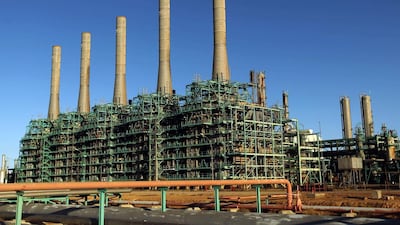Warplanes on Saturday struck militias who captured Libya’s key oil ports a day earlier in a major escalation of the country’s civil war.
Jets from the Libyan National Army (LNA) hit targets outside the ports of Es Sidra and Ras Lanuf, captured on Friday by the Benghazi Defence Brigades militia, as well as troop concentrations further west at the coastal towns of Ben Jawad and Harawa.
With the country’s two principal oil ports out of action, the state-owned National Oil Corporation held emergency meetings to discuss how to protect the port facilities, and whether to divert incoming oil tankers away from the fighting.
The LNA, led by Field Marshal Khalifa Haftar, retreated from the port areas on Friday but was regrouping on Saturday, with tanks and infantry massing for a counter-attack.
Residents in Ras Lanuf said they were trapped in their homes by the fighting, some posting photographs on social media showing buildings ablaze in the town.
The House of Representatives parliament in Tobruk, which administers the LNA, said one soldier and 10 “terrorists” had been killed so far in two days of clashes.
The United Nations Support Mission for Libya was meanwhile seeking to mediate in the fighting, with its envoy, Martin Kobler, tweeting: “I call on all parties to refrain from further escalation and ensure protection of civilians and Libya’s natural resources.”
One of the Benghazi Defence Brigades commanders, Yassir Al Jibali, told a Libyan TV station his units had captured the two oil ports, though the National Oil Corporation has yet to confirm if the ports have fallen. “Haftar’s forces carried out air strikes to hinder our troops from advancing, but no casualties were reported among us,” he said.
The fighting puts a question mark over the recent recovery in Libya’s oil exports, the country’s main source of revenue. Production tripled to as much as 700,000 barrels a day since September, after the LNA captured Sidra, Ras Lanuf, Brega and Zueitina.
In Tripoli, the UN-backed Government of National Accord called for all sides to cease fighting, insisting it had no part in the militia offensive.
The attack appears to have caught the LNA by surprise. The Benghazi Defence Brigades, comprised of militias driven out of Benghazi city by the LNA, tried twice before, in December and February, to attack the oil ports from bases in the central Jufra region. On both occasions the LNA said the attacks were halted by air strikes. In February, the LNA posted pictures showing what appeared to be dozens of smashed militia vehicles it said it had bombed in the desert south-west of Sidra.
This time, the militias appear to have crossed the desert without interference. One official source in Tobruk said that the Benghazi Defence Brigades have deployed larger formations than before, augmented by fighters from other militias.
The LNA has deployed both MiG 23 jets and Mi-35 attack helicopters to pummel the militia formations. The LNA’s elite formation, the Al Saiqa (Lightning) Brigade, has moved south from its base in Benghazi to spearhead a counterattack on the ports area.
One casualty of the fighting is likely to be confidence in Libya’s oil industry. Field Marshal Haftar’s capture of the ports in September led to cautious optimism that international oil companies could return.
That confidence remains vital to repair an oil sector devastated by war and neglect. Writing in the National last month, oil expert and chief executive of Qamar energy Robin Mills opined: “Without a rapid turnaround in security and political reconciliation, and the return of international operators, Libya’s impressive oil gains will be short-lived.”
foreign.desk@thenational.ae

